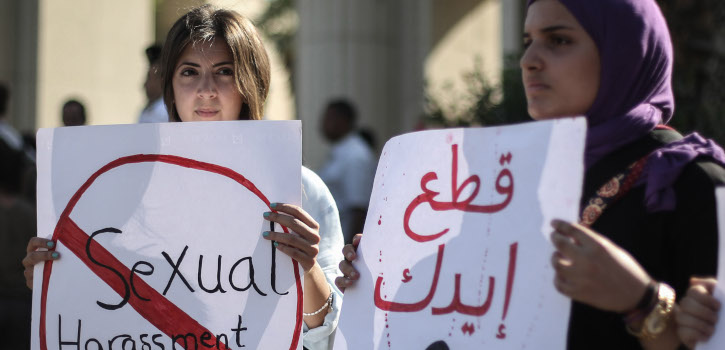In Egypt, sexual harassment is a major public threat against women for which there has been no sustainable policy or practice. Such harassment can range from verbal to physical—the latter of which can lead to severe harm and, in some cases, murder. According to a 2013 United Nations report, nine out of ten Egyptian women have been sexually assaulted—ranging from simple harassment to rape. This demonstrates a real problem that requires rapid and sustainable solutions, policies, and advocacy work. There has been extensive public discussion on the topic for the last couple of years, and the state has denied the breadth and severity of the problem.
Since the 2011 uprisings, sexual harassment and the state’s complicity and participation in it has mitigated women’s social and political participation to situate women into an invisible, apolitical sphere. Egyptian women have actively combatted sexual harassment, emerging as aggressive social and political actors in the face of this. These self-empowering social groups against sexual harassment have created a collective social resistance field where they have challenged existing understandings of gender roles and behaviors.
Harsher laws, but new and existing barriers
In 2014, the Egyptian Penal Code was amended to define and criminalize sexual harassment for the first time and increase penalties for other related crimes. Most recently, in August 2021, it was amended to turn sexual harassment from a misdemeanor into a felony and increase penalties for it.
In its latest form, Article 306 bis(a) of the Penal Code sets forth a punishment of between 2 to 4 years in prison and/or a fine of 100,000 LE to 200,000 LE for anyone who “subjects others, in a public or private place, to sexual or lewd matters, suggestions, or hints, whether by sign, words, deeds, or any means, including wired, wireless, or electronic communication.” It additionally sets forth a greater punishment for repeat offenders.
Article 306 bis(b) defines something as sexual harassment if the crime outlined in Article 306 bis(a) is committed to obtaining a sexual benefit from the victim; it establishes a punishment of at least five years in prison. More significant penalties of at least seven years are set forth for sexual harassment committed by specific individuals, when the offender has a certain authority over the victim, if weapons are involved, or if multiple perpetrators are involved.
No one denies the seriousness of the crime of sexual harassment and the importance of confronting it with strict laws—so that the punishment plays its role in this process. However, such amendments may negatively affect the fight against harassment, as converting the offense from a misdemeanor to a felony could have inadvertent consequences. One of them is prolonging the trial process—criminal courts (because of the complexity of criminal proceedings) take much longer than swifter misdemeanor courts. Going through lengthy procedures in the legal system is costly and places high stress on survivors. Although many forms of sexual harassment are punishable under previously mentioned laws, many survivors still do not report sexual harassment to law enforcement. For years, girls and women have been too scared, embarrassed, humiliated, or ashamed to report these crimes in Egypt. Whether fear-based or personal, some survivors do not believe there will be any benefit to reporting sexual harassment. Furthermore, some may not understand the options, as far as what they are legally entitled to including pursuing civil claims seeking financial damages.
There is also the issue of practical application when it comes to these laws in many situations. To access any of the previously mentioned laws, a harassed woman must retain her offender in her custody until the police arrive—or bring him to a police station so that a formal complaint can be filed. This is due to the security and judicial sectors’ lack of enforcement of these laws. According to the Egyptian Centre for Women’s Rights (ECWR), victims reported that police officers refused to file or document their cases. Most survivors find it difficult to prove incidents of harassment—especially in cases of verbal harassment, which often occurs in closed environments such as a workplace. Social stigma also plays a role in reporting and not reporting harassment—adding to the difficulty of reporting procedures and the involved and timely process of filing complaints at police stations. An atmosphere of victim blaming also surrounds sexual harassment through the media and popular culture.
Recommendations
The Egyptian government is responsible for prompt enforcement of laws and training the police forces and judiciary. The government should urge members of the public to report cases with an easy and accessible process in place. The government must support and encourage non-governmental organizations and other social groups to carry out projects and initiatives fighting sexual harassment. Over previous years, many of these non profits have succeeded in raising awareness on university campuses and schools, developing an anti-sexual harassment policies that have been implemented in those spaces.
A final important obstacle needs to be overcome: confidentiality of survivors and witnesses needs to be completely protected. Also, there should be places in each of the departments and prosecution sectors to receive reports of crimes of sexual violence supported by women police officers who have been trained and qualified to investigate such crimes.
Habiba Abdelaal is a former TIMEP Nonresident Fellow focusing on sexual and gender-based violence in Egypt.
